Managing soreness through nutrient intake can make a significant difference in your recovery. Start by staying hydrated; drink enough water and consider electrolyte powders. Incorporate omega-3 fatty acids from fatty fish or walnuts for their anti-inflammatory benefits. Don't forget protein; lean meats or high-fiber shakes support muscle repair. Antioxidant-rich foods, like berries and leafy greens, help your body heal. Adding turmeric to your meals can further reduce inflammation. Aim for whole grains and healthy fats while limiting processed sugars. With these tips, you can effectively ease discomfort and support your body's recovery process. Explore more strategies to enhance your wellness further.
Core Insights
- Stay hydrated by drinking plenty of water and incorporating hydrating foods like fruits and vegetables into your diet.
- Include omega-3 fatty acids from sources like fatty fish, walnuts, and flaxseeds to help reduce muscle soreness.
- Prioritize protein intake at each meal with lean meats, fish, and high-fiber protein shakes for optimal muscle recovery.
- Consume antioxidant-rich foods such as berries, cherries, and nuts to support the healing process and reduce inflammation.
- Incorporate turmeric into meals or drinks for its anti-inflammatory properties that promote overall wellness and recovery.
Stay Hydrated

Staying hydrated is essential for managing soreness after workouts. When you exercise, your body loses water through sweat. This loss can lead to dehydration, which may worsen muscle soreness and recovery time. To combat this, drink water before, during, and after your workouts. Hydration powders can also be beneficial, offering essential electrolytes and vitamins to support recovery and replenish lost minerals.
Aim for at least eight 8-ounce glasses of water daily, but adjust based on your activity level. You can also include hydrating foods like fruits and vegetables in your diet.
If you're engaging in intense workouts, consider electrolyte drinks to replenish lost minerals. Pay attention to your body's signals; if you feel thirsty, it's a sign you need more fluids. Staying adequately hydrated will support your overall recovery and help you feel better after those tough sessions.
Incorporate Omega-3 Fatty Acids
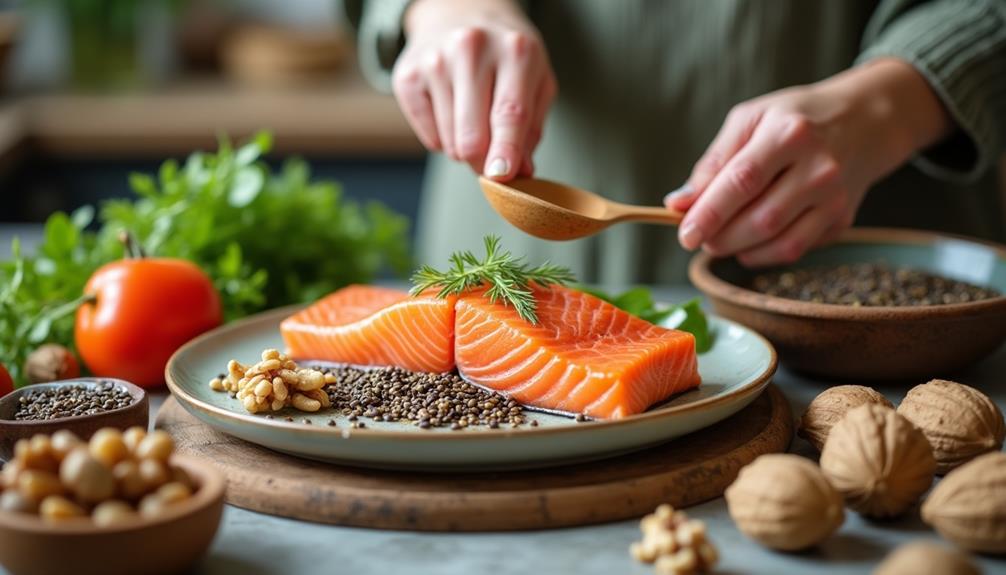
Hydration plays an essential role in recovery, but incorporating omega-3 fatty acids into your diet can further enhance your efforts to manage soreness. Omega-3s are known for their anti-inflammatory properties, which can help reduce muscle soreness after workouts. Green tea extract, another potent antioxidant, can complement omega-3s in fighting inflammation and supporting recovery. You can easily add omega-3s to your meals through sources like fatty fish—think salmon, mackerel, and sardines. If you prefer plant-based options, walnuts and flaxseeds are also excellent choices.
Aim to include these foods a few times a week for best benefits. You might also consider omega-3 supplements if you're not getting enough from your diet. By prioritizing omega-3 fatty acids, you can support your body's recovery process and feel more comfortable as you bounce back from physical exertion.
Prioritize Protein Intake
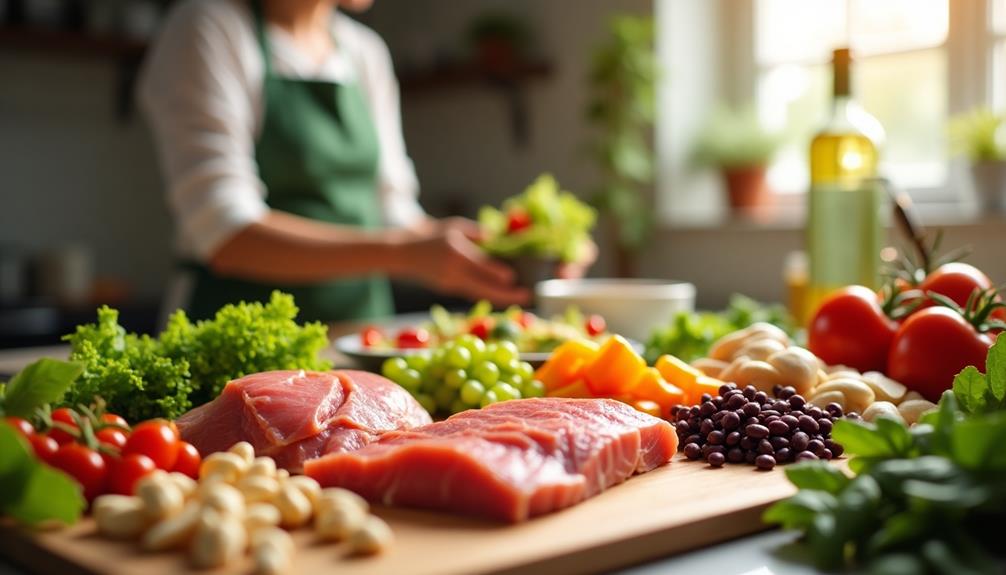
Protein is a key player in muscle recovery and soreness management. When you prioritize protein intake, you provide your muscles with the necessary building blocks to repair and grow. Aim to include protein in every meal and snack throughout the day. This helps maintain a steady supply of amino acids, which are essential for muscle recovery. For those looking to boost their nutrient intake, high-fiber protein shakes can be an excellent option to combine protein with additional health benefits.
To enhance your protein intake, consider these options:
- Lean meats like chicken and turkey
- Fish, especially salmon and tuna
- Eggs, which are highly versatile
- Plant-based proteins such as beans and lentils
- Greek yogurt or cottage cheese for a quick snack
Consume Antioxidant-Rich Foods
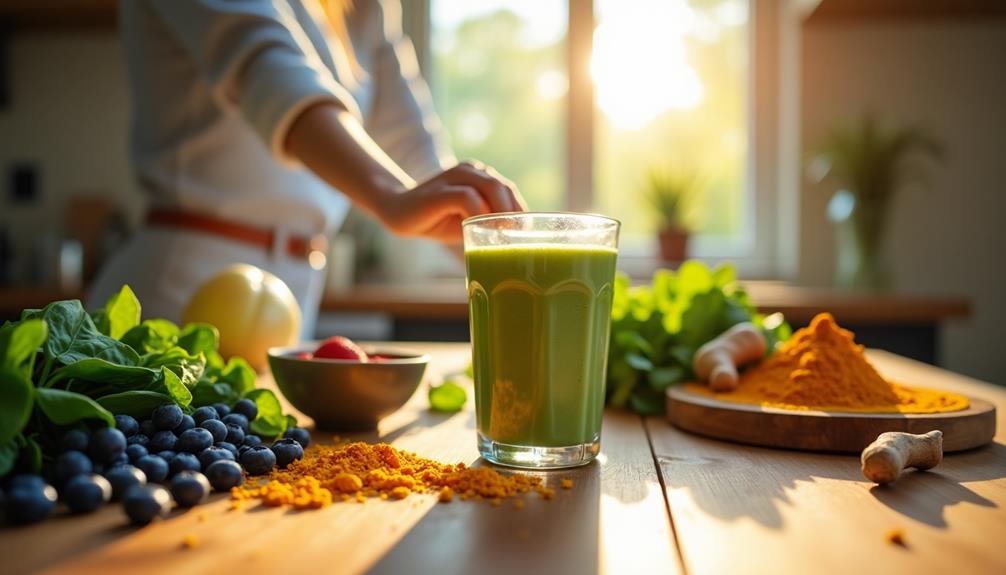
You can start your day with a smoothie packed with spinach and berries. Snack on walnuts or almonds for a healthy boost. Consider adding colorful fruits like cherries and blueberries to your meals. These choices not only add flavor but also support your body's healing process.
Add Turmeric to Your Diet
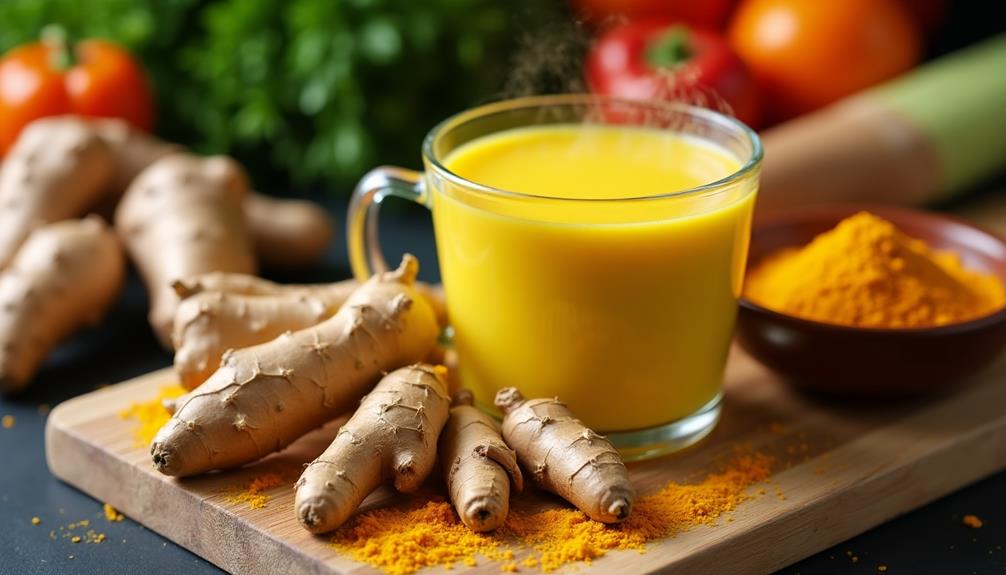
While adding turmeric to your diet might seem like a small change, its anti-inflammatory properties can greatly help manage soreness. Curcumin, the active compound in turmeric, has been shown to reduce inflammation and support recovery. You can easily incorporate it into your meals or beverages. Here are some simple ways to enjoy turmeric:
- Add turmeric to smoothies for a nutrient boost.
- Sprinkle it on roasted vegetables for added flavor.
- Mix into soups or stews for warmth and richness.
- Brew turmeric tea by steeping it in hot water with honey.
- Use turmeric in marinades for meats or tofu to enhance taste.
Incorporating turmeric into your diet could significantly ease discomfort and promote overall wellness.
Embrace Leafy Greens
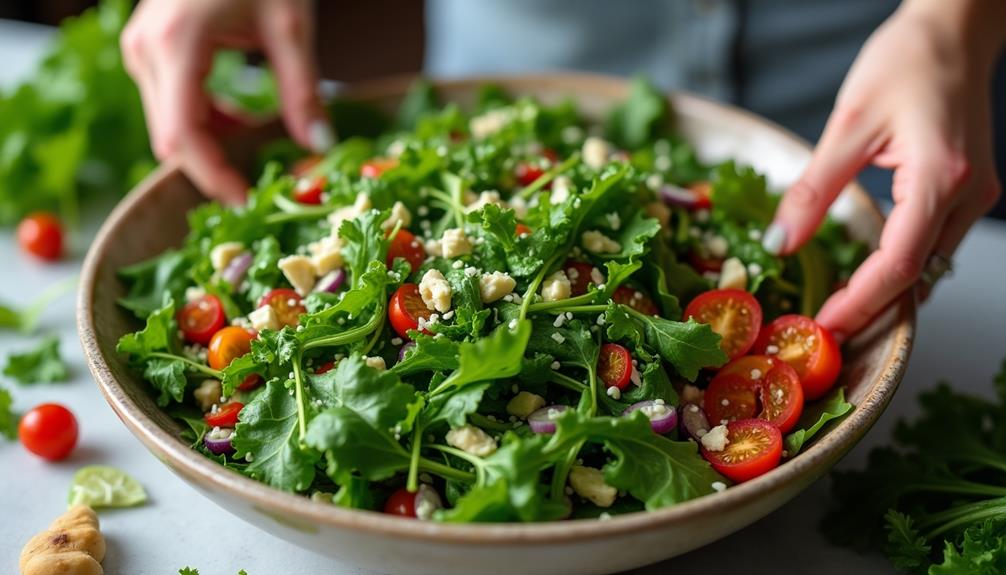
Many people overlook the power of leafy greens in their diets, yet these vibrant vegetables are packed with essential nutrients that can aid in managing soreness. Leafy greens like spinach, kale, and Swiss chard are rich in vitamins A, C, and K, as well as minerals like magnesium and calcium. These nutrients support muscle recovery and reduce inflammation, helping you feel better faster.
Incorporating these greens into your meals is easy. Toss them into salads, blend them into smoothies, or sauté them as a side dish. Aim to fill half your plate with these nutrient-dense vegetables. By embracing leafy greens, you're not only enhancing your nutritional intake but also giving your body the support it needs to recover from soreness effectively.
Choose Whole Grains
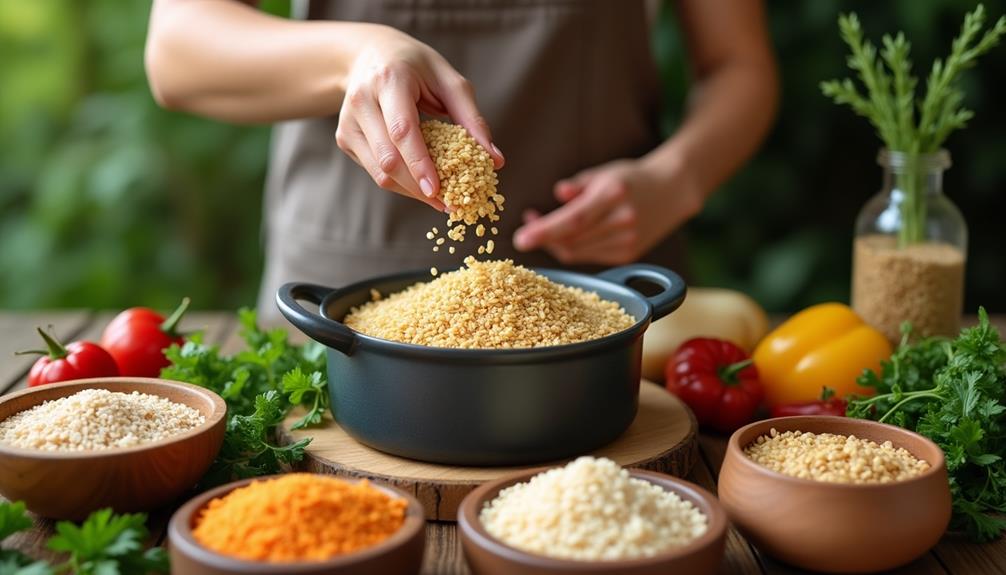
In addition to leafy greens, whole grains play a significant role in managing soreness and promoting recovery. They provide essential nutrients and energy that your body needs after intense workouts. Whole grains are rich in fiber, which aids digestion and helps maintain stable blood sugar levels. This stability guarantees you have the energy to recover effectively from soreness. Including whole grains in your diet can also reduce inflammation, further easing discomfort.
Here are some whole grain options to incorporate into your meals:
- Brown rice
- Quinoa
- Oats
- Barley
- Whole wheat bread
Opt for Healthy Fats
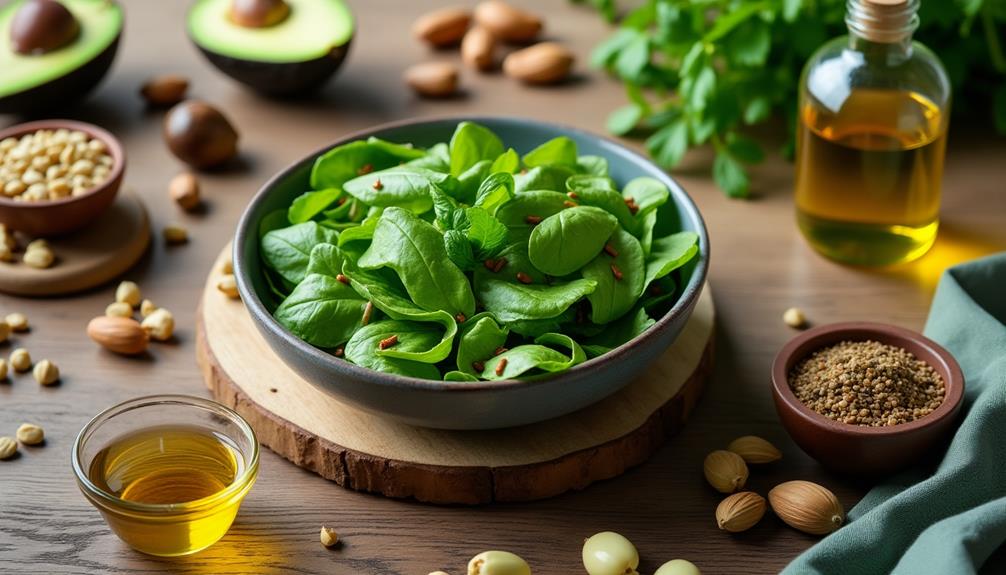
Healthy fats are essential for managing soreness and enhancing recovery after workouts. Incorporating sources of healthy fats into your diet can greatly support your body's healing processes. Foods like avocados, nuts, seeds, and olive oil provide beneficial fatty acids that help reduce inflammation. These fats also aid in nutrient absorption, ensuring your body gets the vitamins it needs for recovery.
Aim to include healthy fats in each meal. For instance, add sliced avocado to your salads or sprinkle nuts on your yogurt. Not only do these options taste great, but they also fuel your body effectively. Remember, moderation is key, so balance your intake with other nutrients. By opting for healthy fats, you'll boost your recovery and help manage soreness more effectively.
Snack on Berries

Incorporating berries into your diet can be a delightful way to manage soreness. These small fruits are packed with antioxidants and vitamins, which can help reduce inflammation and speed up recovery. Plus, they're easy to snack on!
Here are some tips to enjoy berries:
- Add them to your morning yogurt or oatmeal for extra flavor.
- Blend them into a smoothie with spinach and protein for a nutritious boost.
- Toss them in a salad for a rejuvenating twist.
- Freeze them to use as ice cubes in your drinks during hot days.
- Pair them with nuts for a satisfying snack that combines protein and healthy fats.
Limit Processed Sugars

Processed sugars are hidden culprits in many foods, and they can significantly exacerbate soreness and inflammation. When you consume high amounts of processed sugars, your body can experience increased inflammation, which may amplify discomfort. To limit processed sugars, start by checking labels on packaged foods. Look for added sugars like sucrose, fructose, and corn syrup.
Next, choose whole foods whenever possible. Fresh fruits, vegetables, and whole grains are excellent alternatives that provide essential nutrients without the added sugars.
Also, consider reducing sugary beverages. Opt for water, herbal teas, or infused water for hydration.
Frequently Asked Questions
How Does Hydration Affect Muscle Recovery and Soreness?
Did you know that dehydration can impair muscle recovery by up to 30%? Staying hydrated helps transport nutrients to your muscles, reducing soreness and enhancing recovery, so drink plenty of water before and after workouts.
Can Supplements Replace Nutrient-Rich Foods for Soreness Relief?
Supplements can't fully replace nutrient-rich foods for soreness relief. Whole foods provide essential vitamins, minerals, and antioxidants that work synergistically. You'll get better recovery benefits from a balanced diet rather than relying solely on supplements.
Are There Specific Foods to Avoid for Reducing Soreness?
Did you know that consuming processed foods can increase inflammation by up to 50%? To reduce soreness, avoid sugary snacks, refined carbs, and excessive alcohol, as they can exacerbate discomfort and hinder recovery.
How Long Does It Take for Dietary Changes to Affect Soreness?
It usually takes about a week or two for dietary changes to notably impact soreness. Your body needs time to adjust and utilize the new nutrients effectively, so be patient and consistent with your choices.
Does Timing of Nutrient Intake Influence Muscle Soreness Recovery?
Just like the sun rises and sets, the timing of your nutrient intake can greatly influence muscle soreness recovery. Eating strategically after workouts fuels healing, allowing your body to mend and rise stronger for the next challenge.

